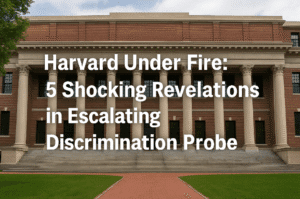Harvard Under Fire: 5 Shocking Revelations in Escalating Discrimination Probe
The U.S. Department of Health and Human Services (HHS) has expanded its civil rights investigation into Harvard University, originally focused on pro-Palestine imagery at a 2023 medical school commencement, to include alleged discrimination across the entire institution since October 7, 2023. Federal officials now demand internal documents from Harvard’s antisemitism and anti-Arab bias task forces—including draft reports and participant names—by May 2.
The probe scrutinizes compliance with Title VI antidiscrimination laws amid claims of unsafe environments for Jewish, Muslim, and Arab students. This escalation coincides with the Trump administration withholding over $2 billion in federal grants, signaling heightened political pressure. Despite preliminary task force findings in June 2024 acknowledging “widespread discrimination,” final reports remain delayed, fueling criticism of institutional paralysis. The case underscores growing federal intervention in campus conflicts, testing Harvard’s autonomy and setting precedents for balancing free speech, safety, and federal oversight in academia.

Harvard Under Fire: 5 Shocking Revelations in Escalating Discrimination Probe
The U.S. Department of Health and Human Services (HHS) has significantly widened its civil rights investigation into Harvard University, marking a pivotal moment in the ongoing clash between federal oversight and institutional autonomy. Initially launched in February 2024 to examine pro-Palestine imagery displayed by Harvard Medical School (HMS) students at a 2023 commencement ceremony, the probe now encompasses alleged discrimination across the entire university community since October 7, 2023—the start of the Israel-Hamas war.
What Triggered the Expansion?
According to an April 7 letter obtained by The Free Press, HHS’s Office for Civil Rights (OCR) cited “information obtained during the investigation” as the basis for broadening its scope. Federal officials are demanding access to documents from Harvard’s presidential task forces on antisemitism and anti-Arab bias, including draft reports, meeting records, and the names of individuals involved in their creation. The university faces a May 2 deadline to comply.
This escalation coincides with mounting political pressure. The Trump administration recently paused over $2 billion in federal grants and contracts tied to Harvard, with reports of an additional $1 billion in cuts leaked to The Wall Street Journal. These actions underscore the high stakes for Harvard, which relies heavily on federal funding for research and programs.
The Task Force Dilemma
Harvard’s antisemitism and anti-discrimination task forces, launched in January 2024, were intended to address campus tensions. While preliminary reports in June 2024 acknowledged “widespread discrimination” against both pro-Israel and pro-Palestinian students, neither group has released final findings. Critics argue the delays reflect institutional paralysis, while supporters emphasize the complexity of balancing free speech, safety, and inclusivity.
The HHS inquiry now seeks to scrutinize these internal efforts, raising questions about whether the task forces’ work aligns with Title VI of the Civil Rights Act, which prohibits discrimination based on race or national origin in federally funded institutions. Notably, Jewish and Arab/Muslim student groups have separately accused Harvard of failing to protect them—a paradox highlighting the challenges of navigating polarized discourse.
Broader Implications for Higher Education
The investigation signals a growing trend of federal intervention in campus affairs. Since 2023, the OCR has opened similar probes into universities like Columbia and Stanford, reflecting heightened scrutiny of how institutions handle discrimination claims tied to geopolitical conflicts. Legal experts note that Title VI, traditionally used to address racial inequities, is increasingly being leveraged to combat antisemitism, with the Biden administration issuing updated guidance in 2023 linking certain anti-Israel rhetoric to national origin discrimination.
For Harvard, the fallout extends beyond legal compliance. The delay in task force reports has fueled distrust among students and faculty, while funding suspensions threaten research initiatives and operational budgets. Moreover, the university’s reputation as a bastion of free speech hangs in the balance, as federal demands for documents risk perceptions of governmental overreach.
What Comes Next?
Harvard’s response to the HHS demands will likely set a precedent for how universities navigate federal oversight amid contentious cultural debates. Key questions remain: Will the task force documents reveal systemic flaws in Harvard’s approach to discrimination? How will ongoing political tensions influence the investigation’s outcome? And could this case redefine the boundaries of academic self-governance?
As the May 2 deadline looms, stakeholders across academia are watching closely. The investigation’s findings could reshape not only Harvard’s policies but also the broader landscape of higher education’s relationship with federal authority—a reckoning that balances the ideals of free expression with the imperative of protecting marginalized communities.
You must be logged in to post a comment.